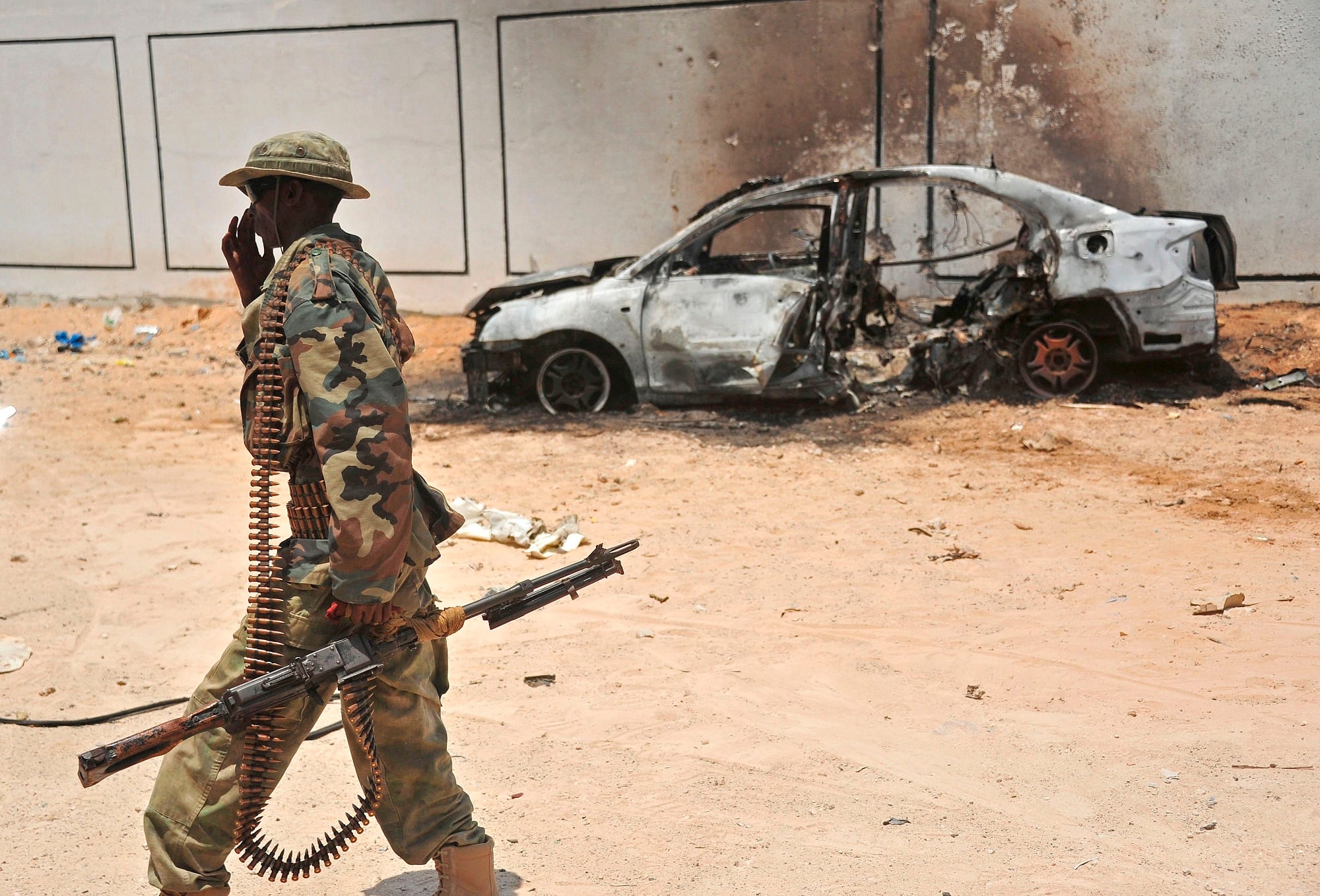U.S. Africa Command conducted more than a dozen airstrikes in Somalia in 2022 in its counterterrorism operations against al-Shabab and aiding the Somali government, an increase of more than 30% over the previous year.
Some in Congress, however, have scrutinized AFRICOM operations, claiming inaccurate counts of civilian casualties and a lack of emphasis on good governance.
The Pentagon conducted 15 airstrikes in 2022 on the al-Qaida-linked group al-Shabab, according to the Long War Journal tracker. According to data from AFRICOM, those strikes killed 107 al-Shabab fighters. However, one recorded instance in February by AFRICOM offered no official numbers, claiming that a “battle-damage assessment is still pending.”
In 2021, AFRICOM conducted slightly fewer strikes, 11 altogether. The command carried out 45 in 2020 and 59 in 2019, a record high since U.S. operations began.
The terrorist group, originally the militant group of the Somali Council of Islamic Courts, took over much of southern Somalia in 2006, according to the Director of National Intelligence’s Counterterrorism Guide. After their defeat by Ethiopian and Somali forces in 2007, the group continued its insurgency across the country, gaining footholds in parts of the south. The group also conducted terror attacks at a shopping mall in 2013, killing 67 in Nairobi, Kenya and in 2014 at a university in Kenya, where more than 150 mainly Christian students were massacred.
Going into 2023, al-Shabab has continued to attack Somalia’s government, including assaults in the capital city of Mogadishu. On Jan. 4, the Associated Press reported that 10 people were killed by suicide bombers targeting a military facility seen as an epicenter of the government’s offensive against the extremists.
In a 2020 joint-Inspector General report, investigators from the State Department, U.S. Agency for International Development and Pentagon said al-Shabab is believed to have between 5,000 to 10,000 fighters in Somalia.
The Pentagon sanctions airstrikes in Somalia through the 2001 Authorization for the Use of Military Force, passed following the 9/11 terror attacks. Since its passage, the United States has used the 2001 AUMF to conduct deployments of U.S. forces and strikes in countries, including Afghanistan, Yemen, Kenya and Djibouti as a part of the Global War on Terror.
Lawmakers critical of strikes in Somalia
Some in Congress have pushed back on the Pentagon’s counterterrorism operations on the continent — and in Somalia in particular — over its alleged ineffectiveness and inaccurate assessments of the impacts such airstrikes have on civilian populations.
In December, Rep. Sara Jacobs, D-Calif., and Sen. Elizabeth Warren, D-Mass., sent a letter to Secretary of Defense Lloyd Austin, expressing concern about the Pentagon’s civilian casualty report released in September. The legislators argued that the report undercounted civilian casualties compared to reports from various human rights and non-governmental organizations.
“If military sources did not show evidence of civilian casualties, then that was often used to justify the conclusion that reports were not credible,” the letter said. “This fails to put proper weight on outside source reporting and puts more trust in military sources...The significant discrepancies between [defense department] and outside reporting suggests outside sources are still not being sufficiently incorporated into [defense department] assessments.”
The letter referred to a 2021 Pentagon-commissioned study by RAND Corporation, which states that the military’s standards for counting civilian casualties, especially in buildings, are often higher than the written standard. The authors of the report argued the military has an “observed propensity” to miss civilian casualties when airstrikes target buildings or structures.
Currently, AFRICOM has claimed that none of its operations in 2022 led to the deaths of civilians.
Jacobs also offered her own critique to Military Times over U.S. actions in the country and the uptick in airstrikes, particularly taking aim at the justification for the use of force.
“There’s no coherent strategy or reasonable legal justification behind the increase of airstrikes in Somalia,” Jacobs wrote in a statement to Military Times. “After nearly two decades of a military-first approach, it’s clear that more airstrikes don’t make the people of Somalia or the United States any safer or bring us any closer to peace.”
Jacobs added that a “long-term, unified strategy that addresses the root causes of conflict” is needed to combat al-Shabab and stabilize the country, including increased efforts on “good governance” and “security sector reforms.”
Soldiers sent — again — as terror activity grows
Airstrikes, however, are not the only tool being deployed by the United States. Military units have also rotated in and out of the country in recent years.
In December 2020, the Trump administration announced that the estimated 700 troops in Somalia training government forces would be relocated to neighboring countries, such as Kenya and Djibouti. The withdrawal concluded on Jan 17. of the following year.
Despite the Trump order, U.S. forces continued to rotate deploying to Somalia for short rotations, working on training local forces and conducting operations. But military leaders were critical of these limited rotations.
In testimony to Congress in March 2021, then-head of AFRICOM, Army Gen. Stephen Townsend called the rotations of U.S. troops into Somalia “not effective.”
However, 18 months after the Trump administration’s decision, the Biden administration reversed course. It announced in May 2021 that less than 500 troops would be deployed to conduct operations and train up Somali forces, but declined to offer a more specific number. The move was motivated by what Biden administration officials viewed as a growing threat by al-Shabab in the region.
While U.S. forces have operated in Somalia, terrorist activity has grown across the continent. In August, the Pentagon’s Africa research office wrote that violent extremist activity in Africa increased more than 300% over the previous decade — and doubled since 2019.
Zamone “Z” Perez is a reporter at Military Times. He previously worked at Foreign Policy and Ufahamu Africa. He is a graduate of Northwestern University, where he researched international ethics and atrocity prevention in his thesis. He can be found on Twitter @zamoneperez.




